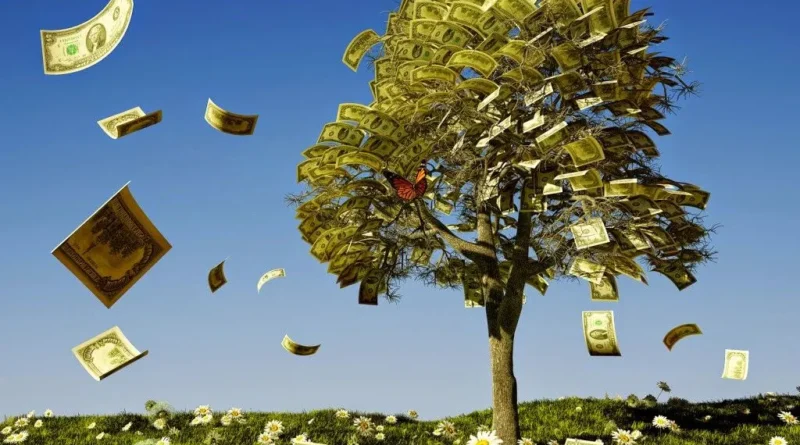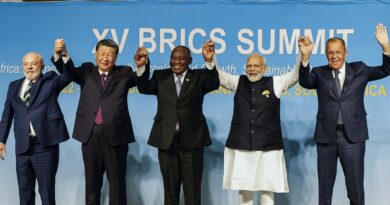Those who pollute, those who pay and those who get rich with green capitalism
PASCUAL SERRANO
The phenomenon of global warming and all that this implies for the future of our planet has generated a movement of concern, concern and reforms at a global level. The simplified speech is simple, the future of humanity is in danger due to the activity of the human being and we must take measures to face this deterioration.
Now, there are many nuances. Are we really all equally responsible? Does it make sense to ask for voluntary actions and sacrifices that can have a very limited impact, if the governments and citizens of the most powerful countries do not take action? Are we sure that some of the proposed measures are effective? Will there not be some and some companies that take advantage of all this to enrich themselves by presenting what is only their business as saviors of the planet?
Those who pollute the most
To begin with, not all of us are equally responsible. American professor Jessica F. Green reveals in her latest book Rethinking Private Authority that 100 companies are responsible for 70% of global emissions.
As for citizens, the picture is similar. According to a study in the journal Nature, almost half of global greenhouse gas emissions in 2019 were the responsibility of the richest 10% of the population. In fact, the richest 1% issued the same as the poorest 50%.
Media, leaders and citizens insist on pillorying (rightly) the brainless who deny climate change, but do not point out those who do not deny global warming but continue to live at full speed. A clear example. No one will deny the protectionist position of the planet of former President Barack Obama and his wife. Yet there you have it traveling on his private jet to Barcelona for the Bruce Springsteen concert, just like the singer did. Likewise, the organization ATTAC in France reported that the soccer player Leo Messi, now in the Paris Saint-Germain team, emitted 1.502 tons of CO₂ last summer in his private plane, as much as an average Frenchman in 150 years of life. Meanwhile, the team's coach and player Kylian Mbappé they made fun of a journalist's question who raised them why the team had flown for a journey of less than two hours instead of going by high-speed rail.
The polluters who never cite
In fact, it is curious how there are certain sectors that, although very polluting, we hardly perceive them as such. They already take care that it does not affect their image.
For example, since 2001, the US Department of Defense has continuously consumed nearly 80% of all government energy consumption. The CO2 emissions from Defense activities (59 million tons of CO2e) plus those associated with the production of weapons (153 million tons of CO2e) we obtain that US military activity was responsible for the emission of 212 million tons of CO2e during 2017, as investigated by the Delàs Center for Peace Studies. Other studies show that since the start of the Global War on Terror in 2001, the military has produced more than 1200 billion metric tons of greenhouse gases. The data is likely incomplete, but even with the data available, the US military issues more than entire countries like Sweden, Portugal or Denmark, and that the Department of Defense accounts for almost 80% of the fuel consumption of the federal government.
In the case of the EU, the The carbon footprint of the entire military sector in the 27 was more than 24 million tons of CO2e (2019), which is equivalent to the CO2 emissions of 14 million cars. Or to the annual emissions of countries like Croatia, Slovenia or Lithuania.
Let's look at other sectors that seem modern and innocuous to us. Because while we're being told off for eating beef, so polluting her, a study published in the journal Scientific Reports, showed that the cryptocurrency mining has an environmental impact comparable to some of the most polluting activities on the planet. As he points out, bitcoin mining has a similar or even higher ecological footprint with the oil extraction or the beef production. The analysis assesses the ecological footprint of bitcoin mining – the process of generating and storing these cryptocurrenciesdas– between January de 2016 and December 2021. In 2020 alone, bitcoin used an average of 75,4 terawatt hours of electricity; more than what countries like Austria (69,9) or Portugal (48,4) consume. That year, moreover, it is estimated that every dollar you generated in the market This cryptocurrency generated the equivalent of $1,50 in global climate damage.
If we search Google for the words Netflix and environment, several proposals for environmental documentaries will appear on that platform, on the other hand, we will not find the information that video downloads during 2018 generated more than 300 million tons of CO, which is equivalent to the total emissions of Spain. It was revealed by a French organization report The Shift Project. Half an hour of a movie watched on the Internet would emit, according to this report, 1,6 kilograms of CO, which is equivalent to driving 6,3 kilometers in a car.
And we continue with the polluting modernities. In the Spanish province of Toledo, one of those that suffers the most from the drought, Meta, the Facebook company, Instagram and WhatsApp, plans to build a data center that will spend a total of 660 million liters of water per year. Of course, the authorities have approved it on a priority basis as Project of Singular Interest.
the business of some
Then there is the business that the environmental discourse is assuming for some. In the annual letter for the year 2021 to its directors, Larry Fink, president of the investment fund BlackRock, the main investor in the eight largest oil companies and controls shares in fossil companies worth 87.300 billion dollars, affirmed that the climate transition is a historic investment opportunity. The same people who have gotten rich destroying the planet now discover the business of getting rich supposedly saving it.
BlackRock is already working on that option with the Climate Finance Partnership, a form of “public-private partnership” linked to renewable energy infrastructure investment in Asia, Latin America and Africa. These are strategies that facilitate private profit through public indebtedness driven by the world bank agenda and the G20 guidelines for turn infrastructure into financial assets. As Rubén Martínez points out in Critic, “are not a rarity, but are part of the dominant paradigm in development finance to make it easier for private capital to exploit the global South. The largest shareholder in fossil companies is running as commissioner and financial mediator of the transition to renewables. He is the same one who finances the war and offers to rebuild Ukraine. Capital does not care about one or the opposite as long as it sounds beneficial.
The French political scientist Édouard Morena, in his book La Découverte, explains how the ultra-rich have become influential players in climate policy since the early 2000s:
"There are billionaire philanthropists like Michael Bloomberg and even, in a way, Jeff Bezos, founder of Amazon and the Bezos Earth Fund. I am also thinking of personalities from the scientific world such as the Swedish Johan Rockström, celebrities such as Leonardo DiCaprio, or even figures from the climate community such as Christiana Figueres, former Executive Secretary of the UN Climate Change Commission, or former American Vice President Al Gore. The famous consulting firm McKinsey gravitates a lot around this “jet-set climate” and contributes to normalize the discourse of green capitalism. These are people you always see at climate summits or at the World Economic Forum in Davos. These large meetings reinforce the feeling of belonging to the same community of "climate heroes" and help to legitimize these actors.
Édouard Morena describes how billionaires have structured networks of philanthropic foundations, NGOs and consultancies that have imposed the idea that companies and private investors are the only legitimate supporters of the transition in the face of climate chaos. A project that aims to perpetuate a capitalism in crisis and silence any idea of a socially just ecological transition.
That is why Morena poses an interesting dilemma: “who should lead the ecological transition? Public actors and social organizations, or the rich from big technology?
while the humble
The point is that we have rich people acknowledging the climate problem but living at full speed, rich people presenting themselves as the heroes of saving the planet, and rich people doing business with the ecological transition. And what happens then with the simple and humble people?
They have been convinced that with their rhythm of life they are responsible for the destruction of the planet and that they must assume the sacrifices now. That is why we have people from impoverished countries, who can barely get three meals a day, talking about degrowth. And to the popular classes in our rich countries, who must pay more taxes on diesel so that the rich receive subsidies for proast electric car. All for the good of the planet.
Even the Bank of Spain, an institution not very characterized by revealing itself for the humble, warned that "the impact of physical and transition risks could be very uneven between individuals." According to your report The Spanish economy facing the climate challenge, "ehe foreseeable increase in the price of the most polluting goods and services that will take place in the coming years will probably have a more pronounced impact on households with the lowest income level, those headed by households between 35 and 45 years of age, those who reside in rural areas, those with a lower educational level or those with a greater number of members”. They even suggest that "it would be convenient for public policies to articulate mechanisms to compensate, on a temporary basis, the most vulnerable households within each of these groups."
I couldn't express more clearly the writer Najat El Hachmi: “The great scam of environmentalism mainstream, the dangerous trap, is having convinced ourselves that individual habits are everything. They are not because the problem is absolutely political and politics is being cowardly before big corporations and their interests. Cowardly or cynical And tremendously hypocritical."
In conclusion, once again capitalism reinvents itself. In the same way that, after the financial crisis of 2008, Nicolas Sakozy said that it was necessary to "refound capitalism", that is, to put into motion the gattopardism that something changes so that everything stays the same, even that some get richer, now the environmental crisis repeats the play. Pretending that something changes so that the model remains the same and, in addition, some, the usual ones, do their business.
The issue now is almost more insulting, they point us all as guilty to make us pay for their green capitalism, in the same way that we already paid for their financial crisis. The move could be dangerous, there is no shortage of far-right and populist voices that are fishing in the troubled river of an indignant population that they are made to pay for damage to the planet that they are not causing. That is why it is essential to denounce the two tricky options that lie in wait for us.












